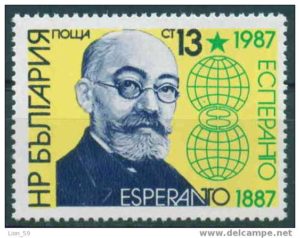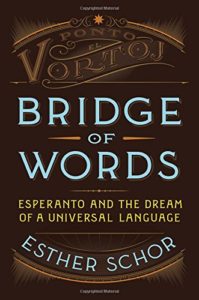
When Esther Schor stumbles, she falls into the most fascinating subjects. Seven years ago, the author stumbled into the language and the world of Esperanto, with little sense of how it would change her life or how she would be gripped by the story of its creator, Ludwig Lazarus Zamenhof.
A Polish Jew, Zamenhof had the idea in 1887 of putting an end to tribalism by creating a universal tongue, designed to be a second language to the entire world, one that would compel its users to transcend nationalism. Basing his invention on rational grammatical principles that would be easy to learn, politically neutral and would allow all to speak to all, Zamenhof launched a utopian scheme full of the brilliance and grandiosity that characterize all such messianic visions.
In Bridge of Words: Esperanto and the Dream of a Universal Language (Metropolitan Books, $32), the first full history of a constructed language, Schor traces the life of Esperanto from its creation, through its turn-of-the-century golden age as the great hope of embattled cosmopolites, to its suppression by nationalist leaders and its resurgence as a bridge across the Cold War. She follows Esperanto’s fortunes in the present, where it lives vibrantly on the Internet and is seen by its users as an essential human counterpart to twenty-first century globalization. And she recounts the impact of this language—which changes the very way one sees others—on her own experience, leading her to upend her life in pursuit of fulfillment.

Rich and subtle, Bridge of Words is at once a biography of an idea, an original history of the twentieth century, and a spirited exploration of the only language charged with saving the world from itself. It is also a story of personal transformation, as Schor travels the globe in pursuit of Esperantists and discovers not only a language but a better way of being.
A great book, and we offer the opinion of it by another noted author, Jonathan Rosen: “Esther Schor has crossed continents, tunneled under the Tower of Babel, brooded over the Twentieth Century’s darkest traumas and brightest dreams, and spoken endless Esperanto in an effort to understand how a language freighted with human tragedy still lives like a kiss on the lips of its speakers. This is a beautiful, mysteriously moving book by a fearless writer who set out to find the soul of a language, knowing full well that it was her own soul she was after all along.”
